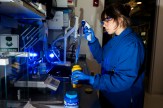Network scientist analyzes life’s ‘digital breadcrumbs’
David Lazer, an expert in social networks and their effects on politics and organizations and one of the 42 tenured and tenure-track professors to join Northeastern this fall, has shown how cell phone usage patterns can predict friendship. Lazer joins the university from Harvard’s Kennedy School of Government with a joint appointment in political science and computer science.
The proof appears in his article on cell phone usage that recently appeared in the Proceedings of the National Academy of Sciences. The article examines how patterns of cell phone use and the proximity of one cell phone to the next can demonstrate levels of friendship among people. Researchers were able to deduce the degree of a friendship by analyzing these patterns—patterns Lazer refers to as “digital breadcrumbs.”
“Friendship is something that is hard to observe because, in a deep sense, it exists in someone’s head,” he says. “People can be friends with someone they haven’t seen for years or rarely talk with.”
The study, conducted with Nathan Eagle of the Santa Fe Institute in New Mexico and colleague Sandy Pentland of the Massachusetts Institute of Technology, documented cell phone use patterns, or “behavioral signatures,” by tracking the number of calls between phones and how far apart the cell-phone users were from one another. The study concluded, with 95 percent accuracy, that patterns of use and proximity could predict which of the study volunteers would identify themselves as friends.
At Northeastern Lazer plans to use this finding to expand his analysis of data on everything from human interactions during political elections to behavioral patterns during flu season. He also plans to work with Northeastern’s media lab researching telephone data to better understand the structures of society and who talks with whom.
Lazer will continue to direct Harvard’s Program on Networked Governance, which fosters research on the interconnectedness of governmental units and provides a forum to discuss the challenges of hierarchical, top-down government.
He’ll now also work with Northeastern’s Center for Complex Network Research, considered the world’s leading research center in network science. Lazer has already worked with the Center’s director, Albert-László Barabási, a distinguished physics professor and leading network scientist. Their coauthored article, “Computational Social Science,” appeared in the February issue of Science.
The article notes that the capacity to collect and analyze tremendous amounts of data has transformed fields such as physics and biology, but that computational social science fields, such as economics, sociology, and political science, have only begun to leverage this capacity “with an unprecedented breadth, depth, and scale.”
“We’re trying to build a bridge between old methods [of data collection] and new,” Lazer says. “The social sciences need to change in reaction to the availability of data.”





